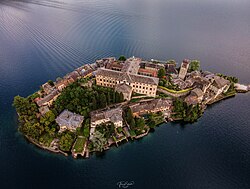Orta San Giulio | |
|---|---|
| Comune di Orta San Giulio | |
 | |
| Coordinates: 45°48′N 8°24′E / 45.800°N 8.400°E | |
| Country | Italy |
| Region | Piedmont |
| Province | Novara (NO) |
| Frazioni | Corconio, Imolo, Legro |
| Government | |
| • Mayor | Cesare Natale |
| Area | |
| • Total | 6.8 km2 (2.6 sq mi) |
| Elevation | 294 m (965 ft) |
| Population (31 July 2008)[2] | |
| • Total | 1,161 |
| • Density | 170/km2 (440/sq mi) |
| Demonym | Ortesi |
| Time zone | UTC+1 (CET) |
| • Summer (DST) | UTC+2 (CEST) |
| Postal code | 28016 |
| Dialing code | 0322 |
| Patron saint | St. Julius of Orta |
| Saint day | January 31 |
| Website | Official website |
Orta San Giulio is a town and comune (municipality) in the Province of Novara in the Italian region of Piedmont, located about 100 kilometres (62 mi) northeast of Turin and about 40 kilometres (25 mi) northwest of Novara. It is one of I Borghi più belli d'Italia ("The most beautiful villages of Italy").[3]

The town itself is built on a promontory which juts out from the eastern bank of Lake Orta close to San Giulio Island, an island which also falls within the municipal boundaries. The frazione Legro stands on the hill which rises behind the promontory, Corconio is some 2 kilometres (1.2 mi) further south, and again away from the lake, while Imola consists of a small number of dwellings between the two, but close to the lake on the road leading to Gozzano. The municipality borders on Pettenasco to the north, Miasino and Ameno to the east, Bolzano Novarese and Gozzano to the south, and San Maurizio d'Opaglio and Pella to the west across the lake.
It is well known for the nearby Sacro Monte, which is a site of pilgrimage and worship and, like the town itself and the island, is a popular destination for fairly small-scale tourism. In 2003, the Sacro Monte of Orta was inserted by UNESCO in the World Heritage List.

In May 1882, Friedrich Nietzsche and Lou Andreas-Salomé, accompanied by her mother and a mutual friend, visited Orta for a few days on their way back from a Grand Tour of Italy. The couple visited the Sacro Monte for some hours and Nietzsche fell in love with the charming Russian. Salomé could not afterwards remember if she had kissed the philosopher and she was not in love with him, a fact which caused him much anguish.
- ^ "Superficie di Comuni Province e Regioni italiane al 9 ottobre 2011". Italian National Institute of Statistics. Retrieved 16 March 2019.
- ^ All demographics and other statistics: Italian statistical institute Istat.
- ^ "Piemonte" (in Italian). Retrieved 31 July 2023.



